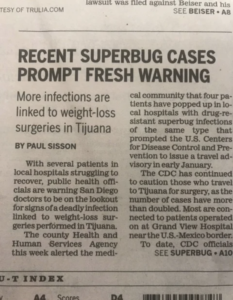We understand that weight loss surgery in the United States is a big investment. That’s why an increasing number of Americans have crossed the Southern border into Mexico in search of cheaper alternatives. Unfortunately, cheaper isn’t always better.
There has been an increasing number of reports from the Center for Disease Control (CDC) that US citizens seeking weight loss surgery in Mexico have contracted a severe drug-resistant bacteria known as Pseudomonas aeruginosa.
Why Do People Seek Cheap Weight Loss Surgeries In Mexico?
Tijuana, Mexico, may seem like a dream come true to those who desperately seek weight loss surgery. The primary appeal is their low prices.
Some clinics in Tijuana will only charge $4,000 for bariatric surgery with anesthesia included. Those who have tight budgets and who are at their wits end often jump at the idea of paying only a fraction of what they would pay in the United States.
However, medical tourists often let the reduced cost blind them to the possible dangers of undergoing a medical procedure in a Tijuana clinic. There have been numerous cases of people coming back from Mexico with life-threatening complications after bariatric surgery.

Regulatory Factors To Be Aware Of
Going into a medical center across the border without proper research can often lead to potentially disastrous results. A trustworthy medical facility will abide by many regulatory factors.
For example, immediate red flags should go up if the clinic you visit doesn’t require its physicians to be board certified. You should also check if the facility offers laboratory services or if they’re HIPAA compliant.
All of these factors, and much more, will determine the quality control of the medical facility. More often than not, doctors in Mexico aren’t required to follow these guidelines.
In fact, it’s common for doctors south of the border (who, to their credit, have graduated from medical school) to open up a practice and cease their medical education from that point onward.
Some doctors even claim to be certified in a specialty field (such as bariatric surgery) despite having insufficient training. Differences in medical training between the United States and Mexico are often not considered by medical tourists.
Tijuana Bariatric Surgeries Gone Wrong

We won’t sit here and tell you every medical facility in Tijuana, Mexico, is “bad for your health” because that statement would be blatantly false. However, we will focus on a particularly pertinent case involving a Utah woman
who battled with Pseudomonas Aeruginosa after bariatric surgery in Mexico.
Ronnie Dotson thought she was saving money by crossing the border and getting weight loss surgery with three other women at the Grand View Hospital located in Tijuana. After all, she didn’t have healthcare, and her options in the United States were limited.
After getting surgery, Ronnie returned home. She was not feeling well, and after being seen at an American hospital, it was determined the incision made during her surgery was infected. As a result, doctors were forced to put Ronnie on a new yet toxic antibiotic to stabilize her.
The Utah Department of Health later confirmed that Ronnie was suffering from the drug-resistant bacteria pseudomonas aeruginosa.
Medical Tourism In Mexico
Ronnie isn’t the only person to come into contact with the pseudomonas aeruginosa strain. There have been four other cases in Utah thus far, with investigations into others currently underway.
Many of these patients were medical tourists who were admitted to Grand View Hospital in Tijuana, Mexico. Now, Dotson’s family can only hope the stronger antibiotic will cure her of the infection before it becomes worse.
Tamika Capone is yet another victim of bariatric surgery gone wrong in Tijuana, Mexico. Tamika desperately needed the surgery to keep control of her weight and blood pressure. Still, she found her husband’s health insurance wouldn’t cover the $17,500 bill for bariatric surgery in the United States.
After seeing a friend get the surgery in Tijuana for just $4,000, Tamika opted to do the same. Four months post-surgery, it was discovered Tamika had contracted the Pseudomonas aeruginosa bacteria. She remains gravely ill despite the variety of medications given to her to treat the condition.
“I’ve not yet had a patient with zero options, but this is as close as I’ve had.” Says Ryan Dare, an infectious disease doctor at the University of Arkansas for Medical Sciences College of Medicine in Little Rock, Arkansas.
Tamika’s doctors fear that she could end up fighting for her life if the infection spreads to her bloodstream. Tamika had also undergone surgery at the Grand View Hospital in Tijuana, Mexico.
Surgery May Become More Expensive Due To Complications
Mindy Blohm of Riverton, Utah, was yet another case of medical tourism gone wrong. After she contracted the deadly bacteria after seeking bariatric surgery in Mexico, she was forced to sell her home to pay down the $50,000 hospital bill she was forced to take on to treat her post-surgery symptoms.
She, too, underwent a bariatric procedure at Grand View Hospital. Thankfully for Mindy, she has fully recovered from the virus.
You CAN Afford Safe Weight Loss Surgery
While stories of surgeries reaching tens of thousands may seem discouraging to many people, there are insurance and financing options that make bariatric surgery very affordable in the United States.
At Olde Del Mar Surgical screening tests are straightforward and designed to help cost-conscious patients obtain the coverage they need for life-changing surgery.
We believe every patient deserves excellent, compassionate, and safe care. Fortunately, Olde Del Mar Surgical has a fantastic complication rate (1% compared to the national rate of 5%), making it a far better choice than taking your chances across the border.
Your health is not the thing to cut corners with. At Olde Del Mar Surgical, you can rest assured you’ll receive high-quality care at the hands of professionals who genuinely care about your wellbeing. Contact us today to learn more about our surgical weight loss procedures.
You May Also Like
-
6-Month Diet Before Weight Loss Surgery
Apr 19, 2023
-
The Importance of Bariatric Support Resources
Feb 19, 2019
-
7 Tips For a Comfortable Bariatric Surgery Recovery
Apr 04, 2019
-
The Importance of the Doctor-Patient Relationship for Bariatric Surgery
Feb 22, 2019
-
How A Fitness Buddy Can Help You Stay Motivated
Mar 04, 2019